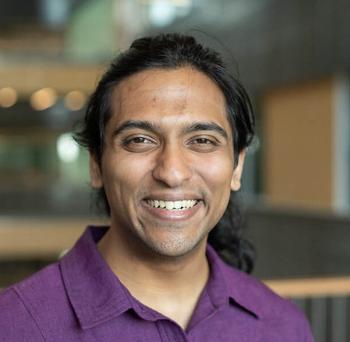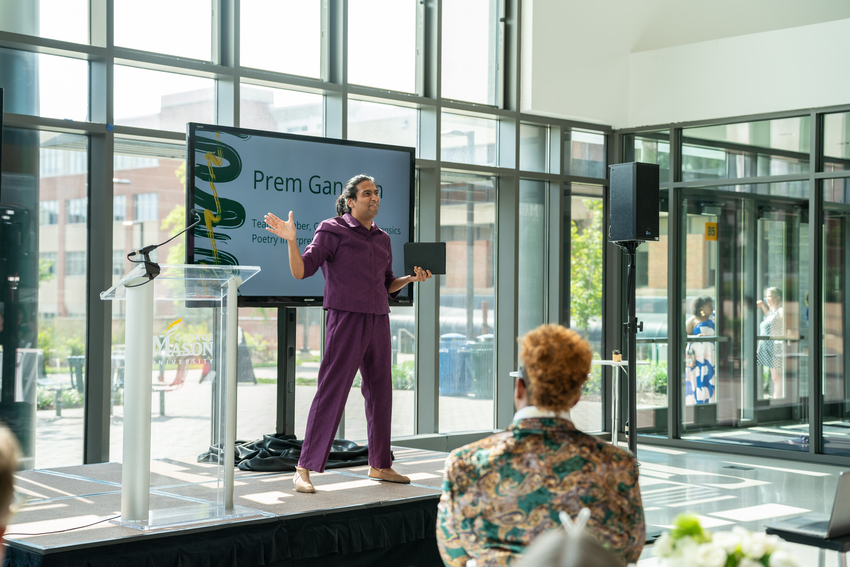When Dawn Lowry, the director of George Mason University’s forensics team, recruits prospective students to join the university’s intercollegiate speech team, she reviews videos of high school competitions.
A competitive speech coach for more than 30 years, Lowry remembers being blown away the first time she watched footage of now economics major Prem Ganesan in action.

“They reminded me of a hurricane—all power, all energy,” Lowry recalls. “It was like if we can figure out how to harness that and control that energy, then they would be a real force.”
Four years later, Ganesan left their mark and legacy on a George Mason program already rich in history.
Ganesan, who is graduating this spring with a bachelor’s degree in economics, won individual national championships during their career in a record six different categories—the most by a student in the 75-year history of intercollegiate competitive speech.
They captured seven national titles in six different categories at national tournaments recognized by the American Forensic Association and the National Forensic Association: After Dinner Speaking, Communication Analysis, Duo Interpretation, Informative Speaking, Poetry Interpretation, and Program Oral Interpretation.
“They are a wonderful mix of artistry and analysis,” said Lowry, who is also an instructor in the Department of Communication. “They have a wonderful ability to find the story that hasn’t been told and show a complete diaspora of human experiences. They give performances that make people cry, but if you look at them closely, they are also technically beautiful.
While still in high school in Minnesota, Ganesan was drawn to George Mason due to its economics program and the forensics team. The competitive speech program, which celebrated its 50th anniversary last year, has ranked in the top five nationally since 2007.
Ganesan has added to that reputation, helping George Mason finish as national champion runners-up three of the last four years. They often delve into LGBTQ+ issues; the Indian diaspora; and issues pertaining to diversity, economic development, and racial injustice.
“There are not a lot of people who look like me,” Ganesan said. “Or who believe what I believe in, who are in this field advocating for what I want to see the world moving toward.”
As a sophomore, their championship-winning speech in the After Dinning Speaking category focused on economics’ diversity problem.
The category, “persuasive in nature,” Ganesan said, requires competitors to present a societal problem, explain why that issue persists and then offer a solution—all within 10 minutes. Ganesan utilized humor, a device they turn to often in their speeches, to address the problem and finish atop a category with more than 100 participants.
“I don’t like aiming for results; I like chasing the process of speech,” Ganesan said. “How can we take new risks? How can we push the bar on performance choices? How can we write cool lines that the audience hasn’t heard before?”

Ganesan has emerged as a leader, serving as a co-captain of the forensics team and teaching at high school speech camps during the summer both at George Mason and Illinois State University, along with coaching part-time at a high school back home in Minnesota.
They were also the senior student representative on the National Council for the National Forensic Association, serving as the voice of the students and pushing for accessibility for all participants at competitions.
“[Prem] is always at the other end of the phone if you need advice,” freshman Emma Schaible said. “They are probably one of the upperclassmen that has been there the most for me and the rest of the first years (on the team).”
Added Lowry: “They are a powerful advocate in making sure everyone has the resources they need.”
After graduation, Ganesan plans to attend Illinois State—Lowry’s alma mater—to pursue a master’s degree in communication. They will also work as a graduate teaching assistant for the university’s forensics team.
Reflecting on their time at George Mason, Ganesan said their interactions with students, faculty, and staff in the Department of Economics and on the forensics team sparked “countless relationships, friendships, and mentors.”
“Diversity is such a cornerstone of my college experience,” Ganesan said. “Interacting with a variety of human beings has been so transformational. I am a lifelong student, so learning from as many different people as possible and then taking their experiences and trying to adapt them into my own little pedagogy has been super cool to do. And speech has taught me how to do that. To take in, not to just communicate, but to listen to other people and learn from them.”
